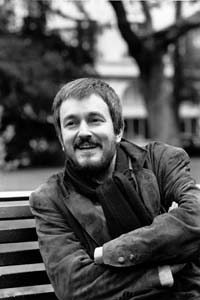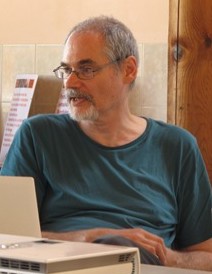Jean-Yves Pollock (born 18 February 1946 in Paris) is a French linguist. [1]
A specialist in comparative syntax, Pollock is best known for his work on verb movement and the structure of IP in French and English.
Jean-Yves Pollock (born 18 February 1946 in Paris) is a French linguist. [1]
A specialist in comparative syntax, Pollock is best known for his work on verb movement and the structure of IP in French and English.

Ivo Livi, better known as Yves Montand, was an Italian-born French actor and singer. He remains one of France's greatest 20th-century artists.
In linguistics, X-bar theory is a model of phrase-structure grammar and a theory of syntactic category formation that was first proposed by Noam Chomsky in 1970 and further developed by Ray Jackendoff, along the lines of the theory of generative grammar put forth in the 1950s by Chomsky. It attempts to capture the structure of phrasal categories with a single uniform structure called the X-bar schema, basing itself on the assumption that any phrase in natural language is an XP that is headed by a given syntactic category X. It played a significant role in resolving issues that phrase structure rules had, representative of which is the proliferation of grammatical rules, which is against the thesis of generative grammar.

The Collège de France, formerly known as the Collège Royal or as the Collège impérial founded in 1530 by François I, is a higher education and research establishment in France. It is located in Paris near La Sorbonne. The Collège de France is considered to be France's most prestigious research establishment.
Synarchism generally means "joint rule" or "harmonious rule". Beyond this general definition, both synarchism and synarchy have been used to denote rule by a secret elite in Vichy France, Italy, China, and Hong Kong, while being used to describe a pro-Catholic Theocracy movement in Mexico.

Yves Marie-Joseph Congar was a French Dominican friar, priest, and theologian. He is perhaps best known for his influence at the Second Vatican Council and for reviving theological interest in the Holy Spirit for the life of individuals and of the church. He was created a cardinal of the Catholic Church in 1994.

Adolphe Sylvestre Félix Éboué was a French colonial administrator and Free French leader. He was the first black French man appointed to a high post in the French colonies, when appointed as Governor of Guadeloupe in 1936.

Jean-Jacques Beineix was a French film director best known for the films Diva and Betty Blue. His work is regarded as a prime example of the cinéma du look film movement in France.

Nouveau réalisme refers to an artistic movement founded in 1960 by the art critic Pierre Restany and the painter Yves Klein during the first collective exposition in the Apollinaire gallery in Milan. Pierre Restany wrote the original manifesto for the group, titled the "Constitutive Declaration of New Realism," in April 1960, proclaiming, "Nouveau Réalisme—new ways of perceiving the real." This joint declaration was signed on 27 October 1960, in Yves Klein's workshop, by nine people: Yves Klein, Arman, Martial Raysse, Pierre Restany, Daniel Spoerri, Jean Tinguely and the Ultra-Lettrists, Francois Dufrêne, Raymond Hains, Jacques de la Villeglé; in 1961 these were joined by César, Mimmo Rotella, then Niki de Saint Phalle and Gérard Deschamps. The artist Christo showed with the group. It was dissolved in 1970.
The Groupement de Recherche et d'Études pour la Civilisation Européenne, better known as GRECE, is a French ethnonationalist think tank founded in 1968 to promote the ideas of the Nouvelle Droite. GRECE founding member Alain de Benoist has been described as its leader and "most authoritative spokesman". Prominent former members include Guillaume Faye and Jean-Yves Le Gallou.

Jean-Yves Le Drian is a French politician who served as Minister of Europe and Foreign Affairs in the governments of Prime Ministers Édouard Philippe and Jean Castex (2017–2022) and as Minister of Defence under President François Hollande (2012–2017). A former member of the Socialist Party, he had been an Independent from 2018 before founding Territories of Progress in 2020.

Henri Wittmann is a Canadian linguist from Quebec. He is best known for his work on Quebec French.

Ouvrage Saint Ours Bas is a lesser work of the Maginot Line's Alpine extension, the Alpine Line. The ouvrage consists of one infantry block. The location is unusual in lacking the underground galleries typical of a Maginot fortification, making it more like a blockhouse than an ouvrage. It was armed with two machine gun cloches and three heavy twin machine guns and six light machine gun embrasures. The interior is laid out on two levels.

Ouvrage Fressinéa, also known as Fraisinéa or Frassinéa is a lesser work of the Maginot Line's Alpine extension, the Alpine Line. The ouvrage consists of one entry block, one infantry block and one observation block at an altitude of 482 metres (1,581 ft). It is associated with the gros ouvrage of Rimplas, the first Maginot fortification to be constructed anywhere. Fressinéa was built between November 1930 and April 1934, accommodating 30 soldiers under a lieutenant with two months of provisions. The initial contractor was Pioljeux. Construction was finished by Thorrand et Cie for 1.7 million francs.
Jean-Gilles Malliarakis is a French far-right politician and writer.
The Fortified Sector of Lille was the French military organization that in 1940 controlled the section of the French border with Belgium opposite Lille. The sector was part of a system of fortifications that included the Maginot Line in other sectors. In the case of the Lille sector, no large fortifications of the kind typified by the Maginot Line were built in the area. Fortifications were confined to a total of 65 blockhouses and 23 infantry shelters within a few kilometers of the border, mainly between Roubaix and Tourcoing and the border. The Fortified Sector of Lille was bordered on the east by the Fortified Sector of the Escaut and on the west by the Fortified Sector of Flanders. The sector figured in the Pillbox affair of 1939-40. It was quickly overrun by German forces during the Battle of France.
The Fortified Sector of Flanders was the French military organization that in 1940 controlled the section of the French border with Belgium between Lille and the North Sea. The sector was part of a system of fortifications that, in other sectors, included the Maginot Line. In the case of the Flanders sector, no large fortifications of the kind typified by the Maginot Line were built in the area. Fortifications were confined to almost two hundred blockhouses built during the 1930s, and some defensive inundations in the vicinity of Dunkirk. The Fortified Sector of Flanders was bordered on the east by the Fortified Sector of Lille It was quickly overrun by German forces during the Battle of France.

Jean-Yves Mollier is a French contemporary history teacher.

Jean-Yves Lechevallier, [ ʒɑ̃ iv ləʃəvæljeɪ ] born in 1946 in Rouen, Normandy, is a French sculptor painter, and laureate of the Flame of Europe art competition organized by the Robert Schuman association for Europe in 1977 to commemorate the 20th anniversary of the Rome treaties.

David Olivier is a French and British philosopher and antispeciesist activist. He is founder of the French journal Cahiers antispécistes, the annual event Veggie Pride and of the annual meeting Les Estivales de la question animale . Olivier is also the creator of the term "veggiephobia" and of numerous articles and conferences. He is an advocate of utilitarian and antinatauralist ethics, and defines himself politically as a progressive.
In formal syntax, a node is a point in a tree diagram or syntactic tree that can be assigned a syntactic category label.